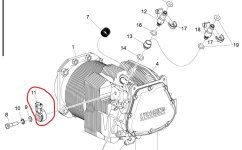Hi all,
This is mostly idle musings, but I was wondering why there is no solution for monitoring magneto timing? I used to own a -7 with P-Mags and I really liked the info that the EI Commander provided, especially around timing divergence.
Given that magnetos have potential nasty failure modes where timing becomes advanced or erratic, why is there no solution to monitor this? It is already possible to read out RPM from p-leads, it seems like it should be relatively easy to monitor pulse trains from both p-leads and at least alert if one of them becomes erratic or if the timing diverges.
This is mostly idle musings, but I was wondering why there is no solution for monitoring magneto timing? I used to own a -7 with P-Mags and I really liked the info that the EI Commander provided, especially around timing divergence.
Given that magnetos have potential nasty failure modes where timing becomes advanced or erratic, why is there no solution to monitor this? It is already possible to read out RPM from p-leads, it seems like it should be relatively easy to monitor pulse trains from both p-leads and at least alert if one of them becomes erratic or if the timing diverges.





